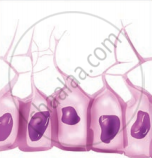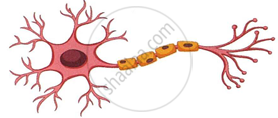Advertisements
Advertisements
Question
Why is the flow of signals in a synapse from axonal end of one neuron to dendritic end of another neuron but not the reverse?
Solution
As the electrical impulse reaches the axon terminal in the region of axon-dendrite synapse, it stimulates the exocytosis of vesicles containing neurotransmitter (e.g. acetylcholine). Neurotransmitter attaches to the chemoreceptor sites of the membrane covering the dendrite end of synapse. It creates a new impulse that travels through cell body and axon of the second neuron. At synapse, the axon end does not contain any chemoreceptor sites so that reverse flow of electrochemical impulses is not possible.
APPEARS IN
RELATED QUESTIONS
Receptor, Spinal cord, Effector, Motor neuron, Sensory neuron.
Differentiate between Spinal nerves and Cranial nerves (number of nerves).
Name the following :
The layer of the eyeball that forms the transparent Cornea
Mention the exact location of Malleus
Fill in the blank:
The neurons carrying impulses from the brain to the muscles are called _______________________.
Write the function of medullary sheath.
Identify the ODD term in each set and name the CATEGORY to which the remaining three belong :
Axon, Dendron, Photon, Cyton
Explain the following term :
Motor nerve
Explain the following term :
Association neuron
Differentiate between:
A Sensory neuron and a Motor neuron (function)
___________ nervous system prepares us for the fight or flight responses.
A neuron contains all cell organelles except ______.
‘A’ is a cylindrical structure that begins from the lower end of the medulla and extends downwards. It is enclosed in bony cage ‘B’ and covered by membranes ‘C’. As many as ‘D’ pairs of nerves arise from the structure ‘A’.
(i) What is A?
(ii) Name (a) bony cage ‘B’ and (b) membranes ‘C’
(iii) How much is D?
Which type of neuroglial cells are depicted in the given diagram?

In a neuron, conversion of electrical signal to a chemical signal occurs at/in
Explain the function of the neuron.
Each branch of the axon terminates as a bulb-like structure called ______
Write one word for the following:
wave of electrical disturbance that sweeps over the nerve cell.
Rearrange the following in correct sequence pertaining to what is given within brackets at the end.
Axon endings - Dendrites - Axon - Perikaryon - Dendron (Neuron structur)
The figure given below is the basic structural and functional unit of the human nervous system. Study the diagram and answer the following questions:
 |
- Write the technical term for the diagram.
- Name two organs of our nervous system where these cells are richly found.
- How are these cells significant for us?
- Name the cell organelle that is absent in these cells and how does it affect our body metabolism?
- Redraw the same figure and label the following Perikaryon, Axon, Dendrites, Myelin sheath and Node of Ranvier.
